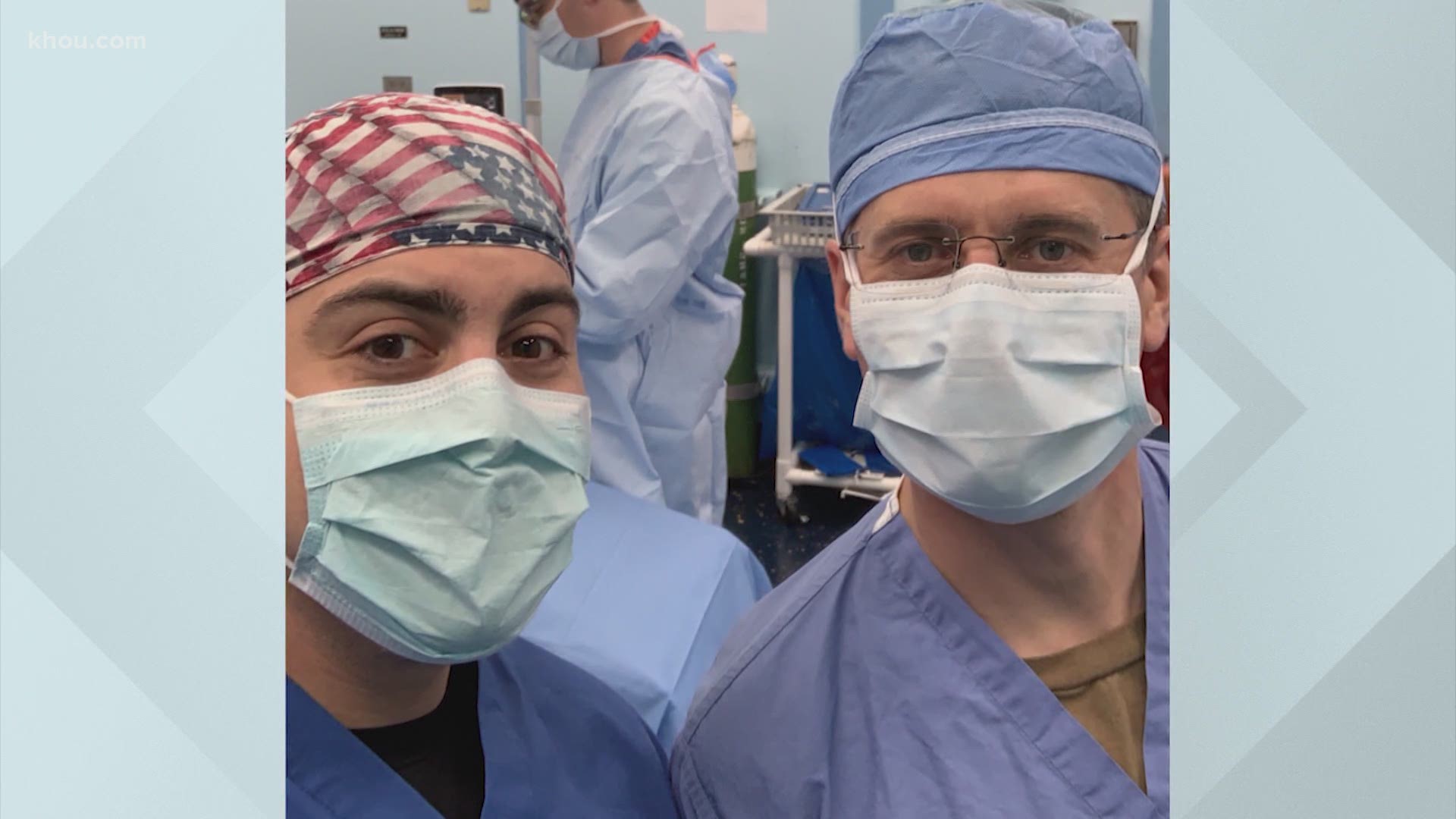HOUSTON — A Houston Methodist surgeon and CRNA are helping to save lives in California. They’ve spent the past several weeks aboard the Navy’s hospital ship, the USNS Mercy.
For Lt. Eduardo Lopez, while the surroundings may feel familiar, his latest assignment is far from home.
“We are a hospital ship, so day to day, I am typically in the O.R." Lt. Lopez said.
It’s a deployment of a different kind.
“We know we’re going into kind of harm's way. It’s different because we’re used to going to other countries to deal with whatever conflicts, and this is at home. So it hits a little differently," Lt. Lopez said.
Lt. Lopez is on the USNS Mercy, a hospital ship that was sent to the coast of Los Angeles to help with emergency surgeries to ease pressure on hospitals there dealing with COVID-19.
But Lopez is not alone. There’s a familiar face beside him: Lt. Commander Tim Sehorn.
“The operating room is excellent here. It’s fully staffed with excellent people and excellent facilities," Lt. Commander Sehorn said.
The two are used to working side by side. They do so often at Houston Methodist Hospital where Sehorn is a general surgeon and Lopez is a nurse anesthetist.
Both were in Houston when they got the call to come aboard the Mercy.
“I had just got off a call shift at Methodist. I was on my way to buy an elliptical when I got the phone call asking me if I wanted to go on Mercy," Lt. Lopez said.
Lopez was a combat medic in the Navy, and Sehorn joined the Navy Reserves a few years ago. This is just another way they’re serving their country.
“I think it gives you a great sense of pride, to come in with people, providers, nurses, caregivers from all over the country, come in and serve an area of the country we don’t usually see," Lt. Commander Sehorn said.
But with their families here Houston, we all hope these two heroes can come home soon.
“I love y'all. I miss y'all. Estella, I love you very much. To my Abuela, te quiero mucho," Lt. Lopez said.
“I love you. Look forward to seeing you in the future," Lt. Commander Sehorn said.
Coronavirus symptoms
The symptoms of coronavirus can be similar to the flu or a bad cold. Symptoms include a fever, cough and shortness of breath, according to the Centers for Disease Control. Some patients also have nausea, body aches, headaches and stomach issues. Losing your sense of taste and/or smell can also be an early warning sign.
Most healthy people will have mild symptoms. A study of more than 72,000 patients by the Centers for Disease Control in China showed 80 percent of the cases there were mild.
But infections can cause pneumonia, severe acute respiratory syndrome, kidney failure and even death, according to the World Health Organization. Older people with underlying health conditions are most at risk for becoming seriously ill. However, U.S. experts are seeing a significant number of younger people being hospitalized, including some in ICU.
The CDC believes symptoms may appear anywhere from two to 14 days after being exposed.
Human coronaviruses are usually spread through...
- The air by coughing or sneezing
- Close personal contact, such as touching or shaking hands
- Touching an object or surface with the virus on it, then touching your mouth, nose or eyes before washing your hands.
Help stop the spread of coronavirus
- Stay home when you are sick.
- Eat and sleep separately from your family members
- Use different utensils and dishes
- Cover your cough or sneeze with your arm, not your hand.
- If you use a tissue, throw it in the trash.
- Follow social distancing
Lower your risk
- Wash your hands often with soap and water for at least 20 seconds. If soap and water are not available, use an alcohol-based hand sanitizer.
- Avoid touching your eyes, nose, and mouth with unwashed hands.
- Avoid close contact with people who are sick.
- Clean and disinfect frequently touched objects and surfaces.
- If you are 60 or over and have an underlying health condition such as cardiovascular disease, diabetes or respiratory illnesses like asthma or COPD, the World Health Organization advises you to try to avoid crowds or places where you might interact with people who are sick.
Get complete coverage of the coronavirus by texting 'FACTS' to 713-526-1111.

